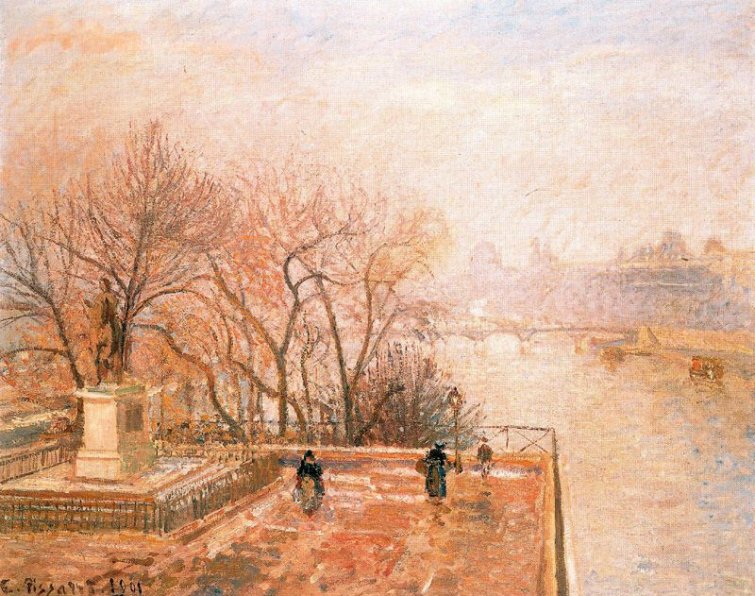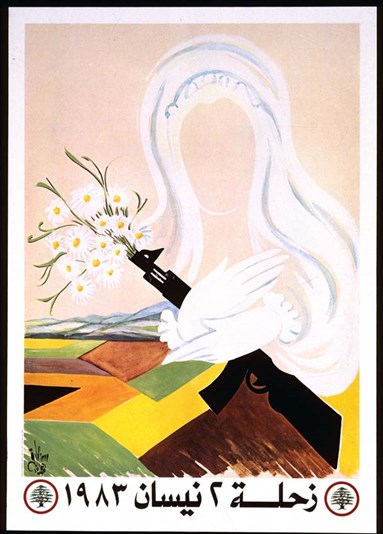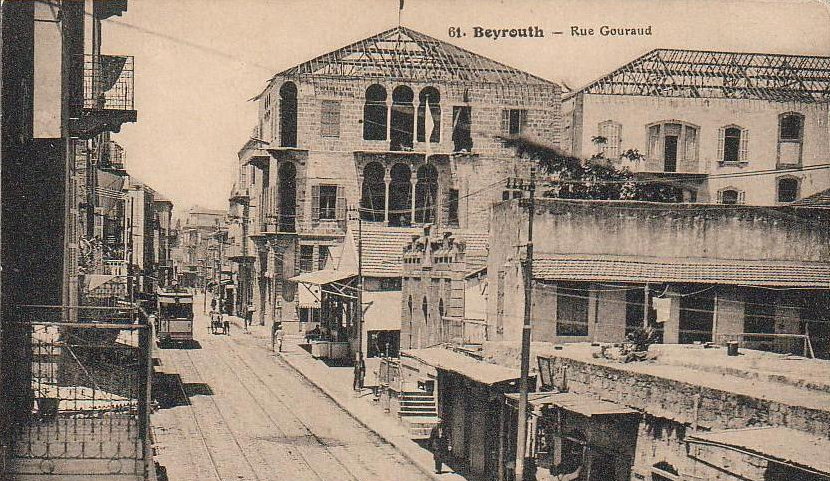First published on THE MANTLE
For E. Magdi & G. Maalouf

[Camille Pisarro, "The Louvre, Morning, Winter Sunshine", 1901]
"Well, no one has ever painted the landscape, man absent but entirely within the landscape"-Paul Cézanne
Passe-partout? Yes, the frame. I had never seen the frame in this painting. When I first saw it, in the years before the war, it seemed to me as if the painting was nothing but a little drawing, in blue, set against faded cerulean cardboard. "A phoenix of a book, written out of the ashes of another book, the novel is a tribute to bitterness and to tenacity - that of the bereft girl of the early 1600's who will, against all odds, become a renowned painter, that of a bereaved author who will write a novel that is surely more original than the one consumed in the fires of war. Loss had made the author free to enter the book, talking to herself and toArtemisia." Did you see the lake, Eman? No, I didn't see it myself. I think there were some young men in a boat. It's a difficult drawing I know, especially if you're focusing on the water, not wanting to see the faces; but if you don't want to draw the faces, you can begin by drawing the empty space around them. You can always imagine not that it is a void, but a still-life; remember the Flemish painters? It was Clara Peeters, I think. "But there was time; this was supposed to last a lifetime." Now the frame was almost bigger than the painting, so adorned, extravagant, baroque.
"How do people paint from memory? And from the memory of others?" That is a legitimate question Eman; my problem with still-life is that it seems as if there, the world is already redeemed and I don't want that. "Injustice is a wine that intoxicates both the judge and the victim. I have known the taste of that wine." I really wanted to be at the lake. It is a lesson, Saint Augustine would say: "Who will hold the heart, and fix it so that it may stand still for a little while and catch for a moment the splendor of eternity which stands still forever, and compare this with temporal moments that never stand still, and see that it is comparable... but that all this while in the eternal, nothing passes but the whole is present." This is the problem with memory, that is so corruptible, because you have access to all of your experience simultaneously; there are no blocks, no fragments. "But if nothing stands still, how do you paint?" I think you need some trust Eman, you need to believe that his essence can be touched, felt as carnal and the lines on the torso seen unsymmetrical, imperfect. "It is Artemisia who becomes a time traveler, a visitor, a phantom so real she can be measured even physically in the author’s consciousness."

[Pierre Sadek, political poster, Battle of Zahlé, 1983]
Love is strange, Eman; it makes you at home by destroying the distance that the world demands for being an object, but yet it is the requirement to make oneself at home in it, with others as well. "It was a faceless love, without end or hope, enlightened, with fogs and snows, an immense river, boats with musicians and dances over the fresh grass". Things are very important to me, thingness, embodiment; but no matter how ensouled, objects do not love you back. "Then why do you want to find the icon? Had you wished it, you would know where to go, perhaps you wouldn't even need to go anywhere at all." Yes, Eman, you're right, nothing has changed. "We chase each other, Artemisia and I, and play to seize each other not without tricks, from the most material and obvious, to the most secretive. I abandon her after the war, during the first journey, from which I say, I may never come back. She pours ink on my paper from a vial and then we stare into each other." Perhaps. Perhaps he has come back. Perhaps a letter already arrived, all while we loitered about. You know, my whole life, I thought Gemayelwas a hero, that he had saved us, that we had won. We all had been lied to. "We're all displaced people after all", George said.
The rubble got into my shoes, all the way to Nottingham, and drowned from time to time at Ye Olde Trip to Jerusalem, that takes its name from the 12th centuryCrusades to the Holy Land. According to the legend, knights who answered the call of Richard I to join the crusades stopped off there for a pint on the way toJerusalem. We might have seen them, George, at Mousayliha, sitting in the pitch-dark. I couldn't remember one single thing and the Englishmen kindly handed out to me old newspapers with pictures from the siege of Beirut, replete with questions. "To write about the past is to write something like fantastic fiction. It is the strangeness of the past, rendered with piercing concreteness, that gives the effect of realism." I had to imagine everything again. "Anna Banti did not want to lose her manuscript in the battle of Florence in early August 1944. No writer could welcome such a destiny." Do you remember, Eman, when we read Joyce? "But this is the point. You die for your country. Suppose. Not that I wish it for you. But I say: Let my country die for me. Up to the present it has done so. I didn't want it to die. Damn death. Long live life".
"Non piangere. Don't cry. Who is talking? And where? It's the author, still in her nightgown (as in a dream, she writes), sitting on a gravel path in the Boboli Gardens -on the promontory on the south side of the Arno -sobbing, telling herself not to cry, and finally ceasing to cry, stunned by the even sharper realization of what was destroyed in the havoc of a few hours before." We've finally arrived, Eman. Beirut. George... How I had missed you, in the thousand years that passed; I'm so afraid, but I promise not to be afraid of that.
[Passages from Anna Banti, taken from "Artemisia: Romanzo", Mondadori, 1953. Passages from Susan Sontag, taken from "A Double Destiny: On Anna Banti's Artemisia", London Review of Books, 2003]

No comments:
Post a Comment